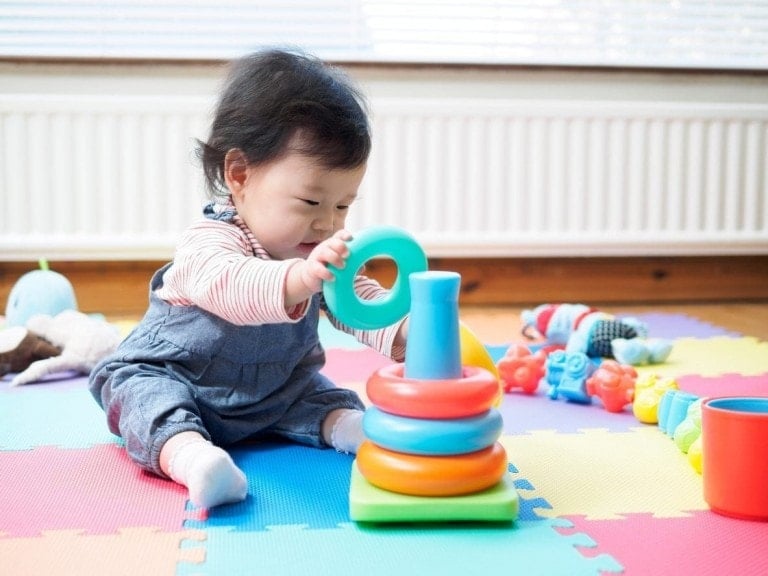As the parent of not only a threenager but an incredibly strong-willed child, it’s an understatement to say that parenting this type of personality can be challenging. We began to notice bold tendencies in our daughter pretty much immediately. During these toddler years, it’s been undeniably stressful at times to know how to handle her by peacefully parenting in certain situations.
However, though I don’t have all the answers – though I’m far from a perfect parent – and though I’m still learning how to do this mom thing – there are certain things my husband and I have incorporated in parenting her that have made our days, and nights, more peaceful than not.
5 Tips for Parenting a Strong-Willed Child
So, to be a lending hand if you have a strong-willed child, here are 5 tips for peacefully parenting your strong-willed child:
1. Give Them Choices
We found that giving our daughter choices was highly effective. We often tell her to do something, and she throws a fit because she doesn’t want to do it. Or, we start making dinner, and she begins to freak out, disapproving of what we will feed her. Or, when we put her to bed, she gets upset with the kind of stuffed animal we give her to sleep with.
So, in these cases, we give her only two choices, and she has to pick one. When she starts getting upset, we will say:
“Okay, you either pick up your toys or put the books back on the shelf. Which one do you want to do?”
or
“You can eat the spaghetti we are making or leftover chicken from last night. Which one do you want?”
or
“You can either sleep with the purple dog or the pink bear. Which one will you choose tonight?”
With strong-willed personalities, giving them choices also gives them a sense of control over the final decision—while at the same time, it still aligns with the parent’s motive to get their child to abide by the same plan and schedule.
2. Divert Their Attention
Naturally, toddlers and kids, especially those with strong-willed personalities, have one-track minds and self-centered tendencies. They want what they want when they want it and the way they want it. Yet, since they are still young, their minds are easily distracted by things they might find more interesting.
For our daughter, we’ve learned that diverting her attention away from the current problem lessens the severity or time length of a potential tantrum or cry-sesh. So during moments when she is upset that Netflix isn’t loading, or when she fell and scraped her knee outside, or when she is begging for a piece of candy at the grocery store counter, we will instead say things like:
“It looks like the internet is down. But guess what?! Would you like to walk to the park and play on the slide?! It’s a beautiful day outside. Maybe some of your friends will be there!”
or
“I’m so sorry you fell and hurt yourself. Let’s pick out which bandaid you want to put on—the Elsa one or the Mickey one. Then you can show your pretty bandaid to Daddy when he comes home from work!”
or
“You know what? That candy needs to stay in the box. But guess who has candy at her house? GRANDMA! We’re going to her house right after this, and you can pick which one you want!”
Diverting their attention to something else they enjoy will steer their minds away from the current problem and give them something to look forward to instead.
3. Try to Understand Their Point of View
During fits or tantrums, sometimes we have no idea what triggered it or what she is upset about in the first place. It’s easy to want to throw up your hands and ignore it, get angry, or want to give up and give in to whatever they’re demanding. However, I’ve learned to try to put myself in her shoes – in the mind of a 3-year-old – who clearly has drama levels and theatrics that skyrocket high above my 28-year-old level of rationale and reasoning.
I’ll tell her during these fits, “Baby, use your words. Otherwise, I don’t know why you’re crying.” Once she tells me, I realize that it is probably pretty devastating for a 3-year-old that her favorite Moana necklace is broken. Or yeah, it is probably frustrating that her little brother yanked on her ponytail for the 45th time. Or yeah, seeing shadows in the closet at nighttime is scary.
Acknowledge their frustrations. Understand that their fears are legitimate. Recognize their hurts as if they are highly important. Don’t brush those things off – instead, embrace them. Love on them. Let them talk it through, and talk to them right back with a tone of love and patience.
4. Remove Them From the Situation During Tantrums
Sometimes, it’s inevitable. They will throw fits, and it will seem like nothing is working. During moments like this, we have to just pick her up and remove her from the situation.
If it’s at home, we will pick her up and place her in her time-out chair in the corner of the kitchen, away from her toys and other distractions, with a timer set until she can come out. If it’s in public, we will pick her up, take her to the car, and tell her we won’t return inside until she stops crying.
It’s important to realize and understand that discipline is still vital for training our children to become respectable humans one day—and for us. Removing our strong-willed daughter from all the action has been the most effective way for her to learn to obey. We still need to take control as parents, even with kids who seem to always want to take control themselves.
5. Don’t Discipline During Emotional Moments
By far, the most ineffective way to get through to a strong-willed child is to try and discipline them when emotions are at their highest. She’s screaming, you’re frustrated, she’s crying, you’re fed up, she’s flopping around, you’re yelling at her. Nope – with strong-willed children, disciplining during the heat of it all will only make it worse, and they will never learn from it. Instead, they will only react and remember it negatively – and so will you.
We have had to learn to wait—simply, wait. Allowing her and us to cool off before we can have any sort of stern discussion. Allowing time to pass for patience to enter will give us just enough grace to discipline her in a way that is out of unconditional love. Allowing a change of scenery or separation in separate rooms of the house gives us enough grace to handle this parenting struggle the right way – full of calculated wisdom rather than emotional foolishness.
Through It All, Though, Remember This About Your Strong-Willed Child:
Their personality will make them leaders one day.
Their drive will make them successful one day.
Their ambition will make them an inspiration to people one day.
Their strength will make them a world-changer one day.
And with tears in your eyes and a heart full of pride, you’ll watch them and say, “That’s my baby.”



































